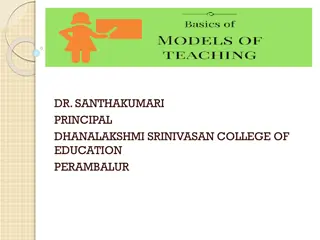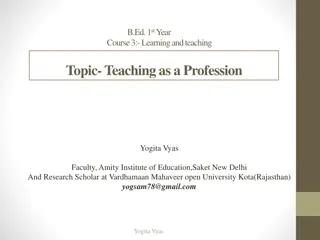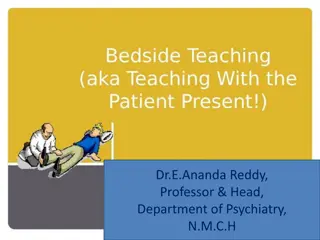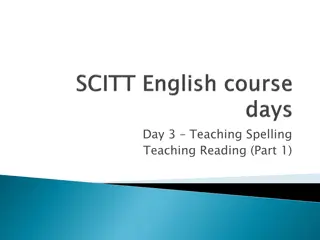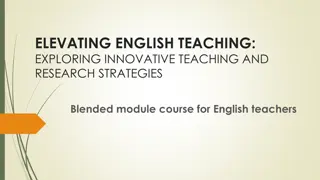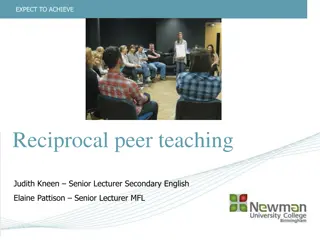Importance of Teaching English at Different Education Levels
English language holds a significant position in the educational system and national life of India. This presentation by Dr. A. Mary Delphine highlights the aims and objectives of teaching English, emphasizing its importance in India and the modern world. The objectives include understanding the rationale for learning English, identifying aims of teaching English in schools, and familiarizing with teaching English as a second language. The presentation discusses the primary, secondary, and higher-secondary level aims of teaching English, focusing on foundational language skills development at each level.
Download Presentation

Please find below an Image/Link to download the presentation.
The content on the website is provided AS IS for your information and personal use only. It may not be sold, licensed, or shared on other websites without obtaining consent from the author.If you encounter any issues during the download, it is possible that the publisher has removed the file from their server.
You are allowed to download the files provided on this website for personal or commercial use, subject to the condition that they are used lawfully. All files are the property of their respective owners.
The content on the website is provided AS IS for your information and personal use only. It may not be sold, licensed, or shared on other websites without obtaining consent from the author.
E N D
Presentation Transcript
COURSE 7(a): PEDAGOGY OF ENGLISH UNIT-1 The Aims and Objectives of Teaching English Presented by Dr. A. Mary Delphine , Principal, St. Justin s College of Education , Madurai
OBJECTIVES OF THIS PRESENTATION: At the end of this presentation, the student- teachers will be able to: 1. Understand The Aims And Objectives Of Teaching English. 2. Know The Importance Of English Language In India 3.Be Clear Of The Rationale For Learning English 4. Understand The Four Important Aims Of Teaching English In Schools 5. Familiarize The Objectives Of Teaching English As A Second Language
INTRODUCTION EDUCATION IS NOT PREPARATION FOR LIFE EDUCATION IS LIFE ITSELF -JOHN DEWEY English has been playing an important role both in our educational system and in our national life. English was supreme during the pre-independent India. it was the language of administration, a compulsory subject in school and college levels.
English still occupies an important place in our educational system and life of our country. English is provocative. It allows people to have their own personal responses. English gives the freedom of self expression, the ability to convey one s own personal thoughts and beliefs. Students enjoy the expressive, subjective nature of English.'
It is the MAJOR WINDOW ON THE MODERN WORLD. Hence the language needs to be mastered.
AIMS OF TEACHING ENGLISH Primary level Secondary level Higher- secondary level
PRIMARY LEVEL To learn alphabets To gain ability to read To have vocabulary To understand English To make small and simple statements To identify things by their names To write English neatly To read simple phrases and clauses sufficient spoken
SECONDARY LEVEL To understand spoken English To Speak simple sentences To Read passages in English without mistakes To spell words with correct pronunciation To respond to simple conversational questions To Write application letters To Read English Newspapers
HIGHER SECONDARY LEVEL To be able to Speak English fluently and accurately. To read English newspapers regularly. To develop the ability to understand the Native speakers and also be able to respond to them. To make narratives and to make notes. To Read English writings and understand them.
HIGHER SECONDARY LEVEL To express one s ideas coherently in the gatherings. To perform English plays in the schools. To appreciate the beauty of the poems learnt. To punctuate correctly while writing. To Write at a responsible speed. To have knowledge on the uses of stress and intonation.
IMPORTANCE OF ENGLISH LANGUAGE IN INDIA OFFICIAL LANGUAGE OF ADMINISTRATION: English has been the official language of our country more than 300 years. It has been declared as the associate official language of the union for an indefinite period by an act of parliament in 1963. LANGUAGE OF THE COURT: English still continues to be the language of the courts in India. There is no other suitable language for legal transactions, not only at the supreme court but also at the supreme court but also at the high courts and district courts.
WINDOW ON THE MODERN WORLD: English is our major window on the modern world -Jawaharlal Nehru It is only language through which we have the distained essence of modern knowledge in all fields of human activity.
LINK LANGUAGE: LINK LANGUAGE: It is the only language which is understood in all states. LIBRARY LANGUAGE: It is the key to the store- house of scientific, technological and computer knowledge. It becomes important in India.
EDUCATIONAL SYSTEM: It plays an important role in the field of education . It is taught as a compulsory subject in most of the states in the country. It is the medium of instruction in the Public Schools, Technical, Medical, Law, And Other Institutions.
RATIONALE FOR LEARNING ENGLISH It is the second language taught in our state It is taught in schools and colleges as compulsory subject To be able to read useful and interesting books in English. To use English in our national life. English is prominent in our social life. It is in our cultural life. It is used widely in politics both in national and international level. It is the literary language. It is the link language. It is the library language. It is the language of Science and Technology It is a major window on the modern world.
RATIONALE FOR LEARNING ENGLISH It is the passport for Employment It is the Lingua Franca It is the communication language ( chatting) It is the web language It is the M mobile language It offers the freedom to explore It fosters creativity It enables learning It develops thinking English promotes participation in Online events and Conferences
FOUR IMPORTANT AIMS OF TEACHING ENGLISH IN SCHOOLS
TO UNDERSTAND SPOKEN ENGLISH The student should be able to understand spoken English requisite in ordinary conversation, exchange of greetings, receiving orders, and directions, listening to lectures talks etc .. Competence can be achieved if we give opportunity to our students to listen to English news, conversation, the narration of the short stories, etc..
TO SPEAK ENGLISH A student to produce sounds with proper stress and intonation speech occupies a distinctive position in bearing a language and it is the base for all language learning. We expect our students to talk fluently in English.
We expect our students to be able to understand the written English in books, magazines, newspaper, etc , at present our students are not able to comprehend materials published in English. Recognition vocabulary of students should be increased to enable them to read English with comprehension.
TO WRITE ENGLISH writing English is in no way less than speaking English. It enables our students to write in simple letters, applications, descriptions and accounts of events, such ability is required in offices. it is also needed in schools and colleges for taking notes of lectures delivered in English.
OBJECTIVES OF TEACHING ENGLISH Cultural aim Integrative aim Literary aim Linguistic aim Utilitarian aim
CULTURAL AIM Our culture is the best culture in the world. English people get excited at the family life of Indians. But Indians are influenced by some of the cultural habits of the British for example -wearing coat, pant, tie, and shoe. They will give a tip-top appearance. They are pleased to say please and thank you . If we speak in English we will be respected by others. A teacher who teaches English as a second language should have mastery over idioms, phrasal verbs, proverbs, names of heroes well known legends and stories.
English is a rich language in literature. During the Elizabethan era and Victorian era the language had flourished. The reign of Queen Elizabeth is regarded as the Golden Age of English Literature. Shakespeare's days are ever memorable in history. English literature is full of works of Poetry, Prose, Drama and Fiction. It is the only means of preventing our isolation from the world rather integrating us with the rest of the world.
UTILITARIAN AIM English is the LINGUA FRANCA of the modern era. It is the medium of instruction in many of the educational institutions. It connects people all over the world. Anglo Indians have English as their mother tongue. We use it for SCIENTIFIC COMMUNICATION, SPACE RESEARCH, BANKING AND BUSINESS. Without English we cannot be successful anything in the world. RESEARCHES,
LINGUISTIC AIM Linguistic is a means of communication without which know progress could be achieved. Every one knows mother tongue from his/ her parents or surroundings. For a period of year begins to speak when he attains three years old. It is because of inborn instincts. Nearly sixteen languages are considered to be national languages. Every one loves his mother tongue. Those who have multi tongues can survive in the universe.
INTEGRATIVE AIM Teaching of English is the unifying factor and helps national integration. English serves as a medium for inter-state correspondence to enable unity in diversity. It is only through English that we can establish social, economic, cultural and political relations with other countries of the world.
English language learning in the school curriculum aims at effective communication across racial and social boundaries, thus binding the nation as a whole. English has to be taught principally as the language of comprehension and communication.
CONCLUSION The aims of education thus help in working towards the achievement of some set goals. It give direction to educational activities. It helps to determine what has to be developed ad deals with the overall development of an individual. Thus having clear out aims in education as well as in all education also. It should be for the growth and development of the individual both for himself and for the society.
REFERENCES Evangelin Arulselvi (2013), Innovations in the Teaching of English, Saratha Pathippagam, Chennai. VALLABI. 2016, Teaching of English,,Nilkamal, Maharashtra Strandgard. Teaching of General English, Content and Methods of Teaching English Pedagogy of English ,Kokila Kanthasamy http:/www.studycircle.com https://www.google.com/search?q=rationale+for+learnin g+english&rlz=1C1SQJL_enIN792IN792




